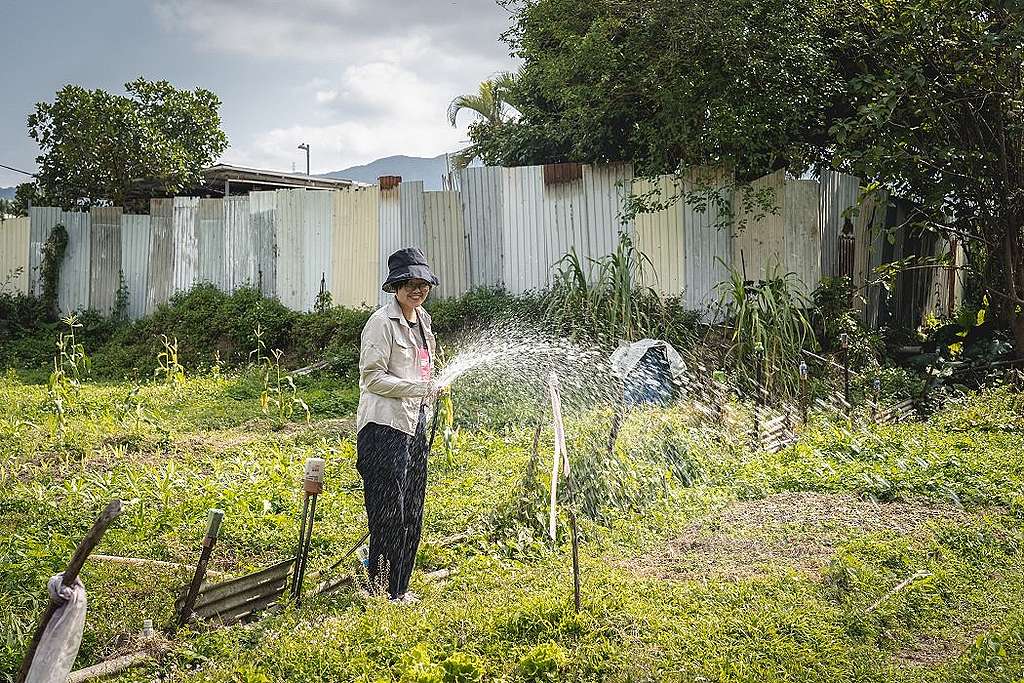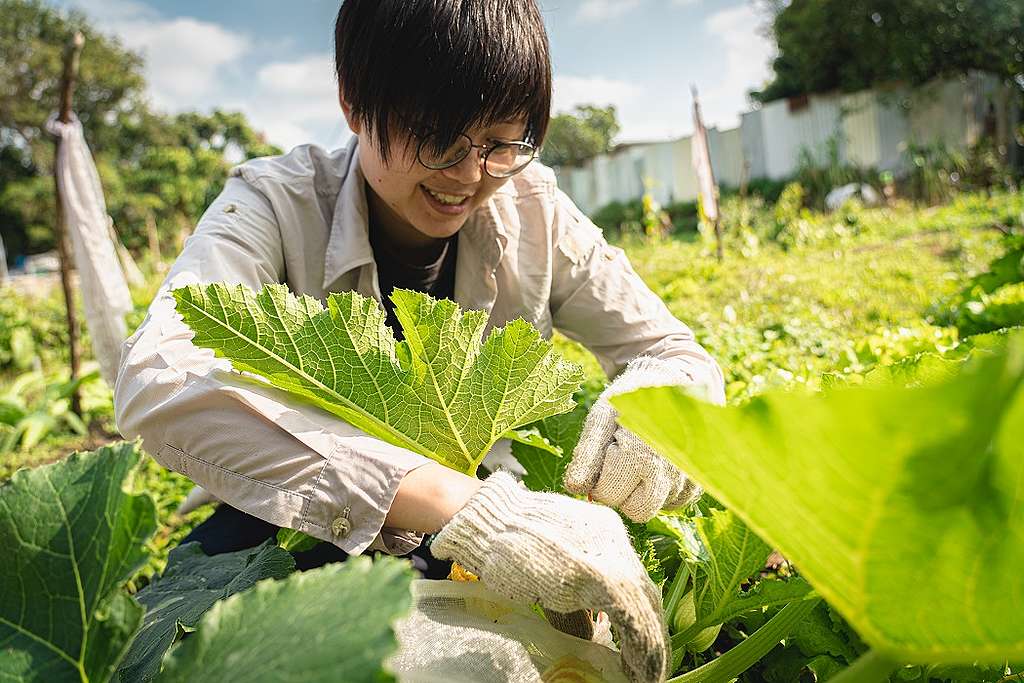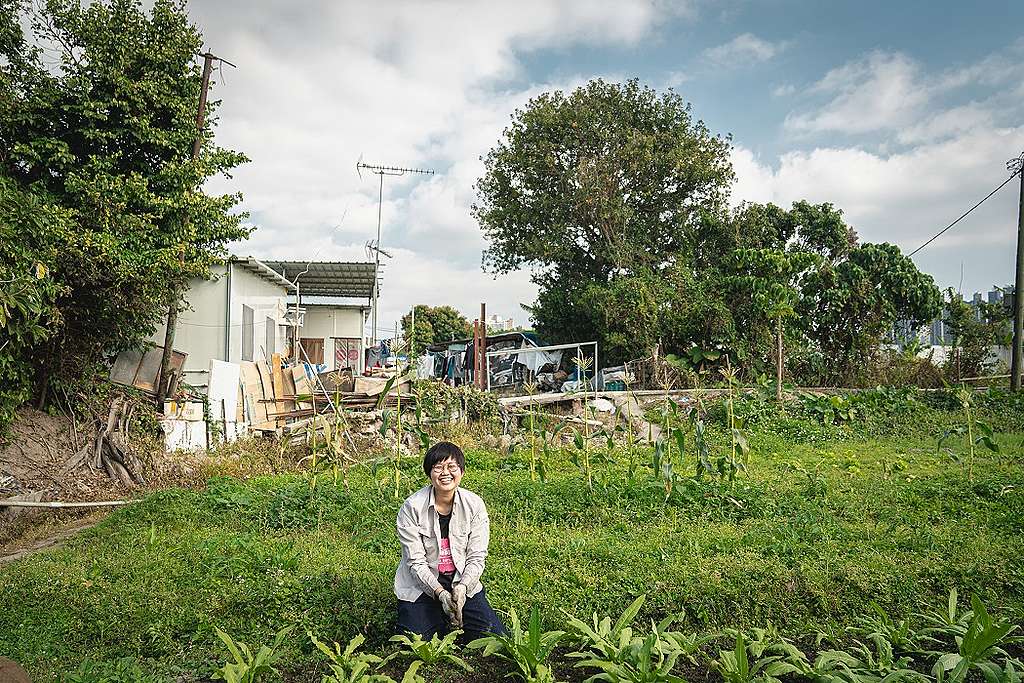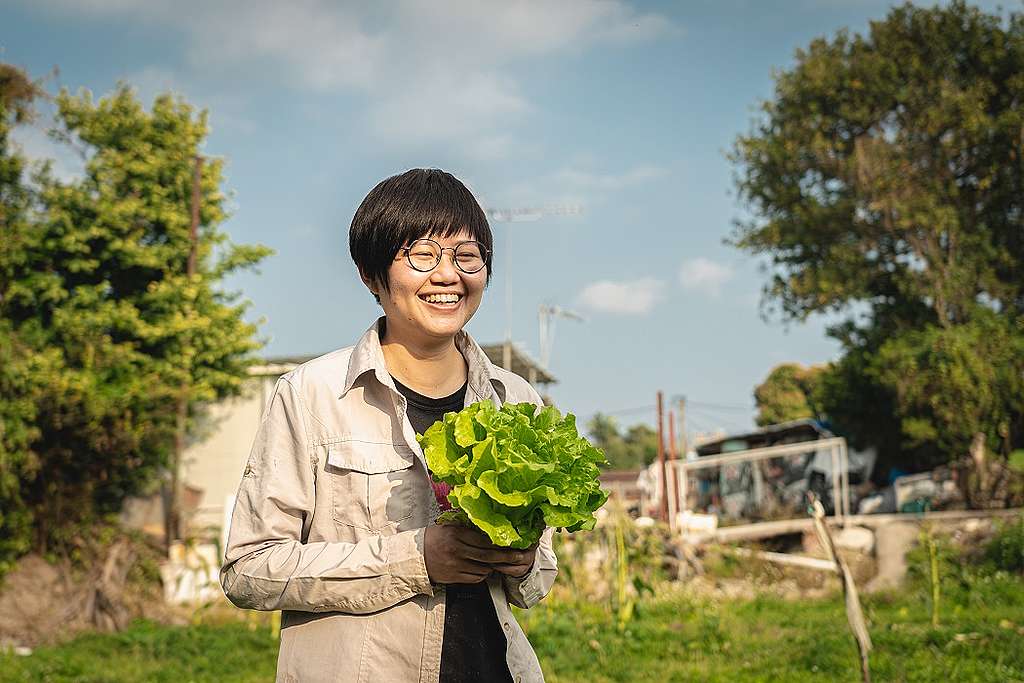Plastic-free Campaigner Leanne Tam has joined Greenpeace for nearly a year, the time when the Hong Kong Government finally kicked off the public consultations on policies addressing single-use plastics issue after years of advocacy. Leanne has devoted her full-time work to various roles at Greenpeace, from standing front at plastic-free advocacy, scientific research, to community engagement. Off work, she goes farming persistently during weekends.

Working at farms gives Leanne a sense of escape from the hectic and stressful work. You may find her campaigning footprints up on hills and streams of the countryside, downtown at community campaign activities. She is also a familiar face to the media, given her active appearance at press conferences and public consultations on green issues.
Gifted with a tall and strong build, Leanne handles the labour work on the green fields. One moment, Leanne was weeding, another time she was watering. Under sweats, she shared her green yet practical experiences on farms.
Following the Heart to the Farm
What brings Leanne to the farm? Why doesn’t she take a rest on weekends instead?
It all began from her brevity to try. As a biology graduate, Leanne’s career aspiration is environmental protection. Known as an ‘extraordinary environmental-friendly individual’, she has been actively devoting her free time to green actions from community recycling and recollection. These experiences inspire Leanne to deal with green issues from the fundamentals, including environmental policy advocacy. To this end, she has joined Greenpeace since 2021 to reach closer to her green aspirations. Near the same time, she followed her heart and began to learn to farm about a year ago.
‘Very few people practise farming nowadays and local produce supply is low. Yet Hong Kong was different in the past. When I was small, grandpa brought up several children working as a farmer.’ With this in mind, Leanne embarked on her farming journey with a trying mind at the best of her physical health.

‘It’s hard being a farmer,’ a line Leanne repeated several times on the interview day. No automated watering system was installed in the fields, she did it manually. Why doesn’t she install one to ease her work? Leanne explained she is a new starter in farming and that is a big investment she is not ready for yet. Installation of a watering system cost over 10 to several hundred thousand Hong Kong dollars, while the field rental contract farmers signed with the landlord are mostly short term, exposing them to high risk investing in equipment and tools with no sufficient time to break even the expenses, she elaborated. This piece of fact reveals challenges and restrictions local farmers face and the core pain to sustain the city’s agricultural development, without any supportive measures from the government.
Beyond Weekend Farmers
Why are there more weeds in Leanne’s field than her neighbours’? ‘My farming operation is different from conventional local operations. Chemical fertilisers and pesticides are commonly used to speed up crop harvesting in commercial farming. It is a violation of natural plant growth, which is detrimental to soil quality. I adopt an approach that encourages natural plant growth in the habitat, allowing the roots of different plants to exchange nutrients and enrich the soil as a whole. Following this practice, I don’t over-seed, over-plough or it will destroy microorganisms found in soil, which are a source of nutrient generation. I fertilise fields with plant compost and kitchen waste.’

Asked if there is any due date for the farming “trial”, Leanne confirmed she was still at an early stage and one year was far from enough. A farming cycle usually lasts for months to years. The first year was a testing phase, based on the harvest, the improvement could be made in the next year, and the farming practice would be adjusted accordingly. A “trial” is a word meaning serious actions and all efforts made in Leanne’s dictionary.
Farming and Environmental Protection
Leanne utilises her knowledge and creativity in full at her farming practice. She introduced to us eco-friendly alternatives to chemical fertilisers: handmaking fruit peel enzymes. She made use of the banana skins leftover from the “Power Juicy Bike” campaign activity on Greenpeace’s “Coffee Meets Climate” Days last year, and prepared them as potassium-rich enzyme fertilisers for the fields. Potassium is a key nutrient for flowers and fruits. Practising eco-farming can be easy, practical, and beneficial. Leanne shows how the handmade fruit skin enzymes could meet various ends in one go: reuse, cost-saving, and nurturing plant growth.
It echoes the essence of the plastic-free campaign she has been promoting for Greenpeace: “waste reduction from the source”, and “reuse” culture. To protect her zucchini from fruit flies and bugs, she needs to wrap the baby fruits once they begin to grow. She firstly make use of foam fruit wraps she collected and wrapped each baby fruit, before adding the more commonly used agricultural fruit bag outside. Once again, Leanne shows us by reimagining the use of resources around us, we can find the potential of their new life in them.
In her weekend farming, Leanne tries her best to practice eco-farming. She pinpoints both agriculture and environmental protection share the concern about land planning and sustainable development. We have a long human history of agriculture, there shall be means through which we can sustain farming without necessarily using chemical fertilisers and causing over-interferences to nature. An equilibrium of ecosystem and environmental development shall be addressed, under the global sustainable development concerns.
Leanne doesn’t see herself as a town person. Friends may jokingly call her an environmental freak. How will she sustain her green initiatives? She responded, ‘if I’m asked how I can turn my own vision to a shared mission among the majority, I’d say through education and promotion. It’s different from propaganda. If others don’t know your views, how will you spread the green message? Let others understand you. Think how you will identify the like-minded and convince a larger group of people to achieve the ideal at the back of your mind.’ To Leanne, working in Greenpeace offers more opportunities and favourable conditions to achieve green ideals.

Leanne’s shiny smile is a perfect match with the sunny day this conversation took place. Her persistence in sustainable development is a silver lining to the city in the challenging time of the pandemic. Despite the pandemic outbreak, Leanne and the plastic-free campaign team keeps promoting environmental policy advocacy, community and corporate plastic-free activities. In 2022, more resources will be invested in illustrating the borrow-and-return system of reusable cups and food containers for takeaway services, in hope of leading Hong Kong to a green future free of plastics. Please stay tuned to our latest actions on leading our way to a green and sustainable future.
